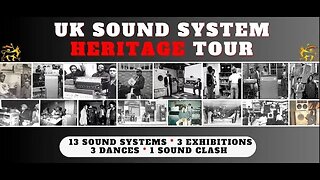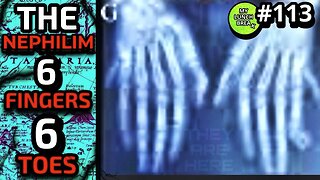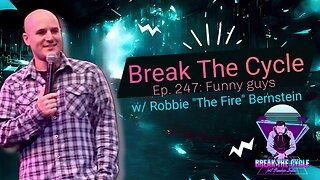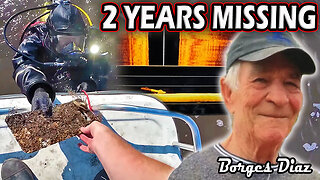Premium Only Content
![Official Foundation Reggae DUB Instrumentals Mix 2020 [King Tubbys & Gussie Clarke]](https://1a-1791.com/video/s8/1/Q/D/c/y/QDcyi.qR4e-small-Official-Foundation-Reggae-.jpg)
Official Foundation Reggae DUB Instrumentals Mix 2020 [King Tubbys & Gussie Clarke]
Official Foundation Reggae DUB Instrumentals Mix 2020 [King Tubbys & Gussie Clarke]
One of the great dancehall and reggae producers, Gussie Clarke has been a successful Jamaican producer since the early '70s when he helmed Big Youth's debut, Screaming Target, and the 1973 debut from I Roy. More known in Britain than in America, many of Clarke's early records were issued there by the Trojan label and as early as 1975 a cult fan base began to emerge around Gussie's dub sound. Later in the decade, Clarke worked on landmark tracks by Dennis Brown ("To the Foundation") and Gregory Isaacs ("Never Be Ungrateful") and eventually he presided over a two-volume set issued by Heartbeat records, titled Dee-Jay Explosion. In 1988, Clarke had another creative and career breakthrough when he opened the Music Works studio. It immediately gained a reputation among the reggae community as the place to record, with Clarke being the DJ to record with, and soon everyone from Shabba Ranks to Maxi Priest was stopping by to lay down tracks. Clarke was still going full-tilt in the '90s, releasing a two-CD retrospective in 1996 and continuing to produce, mix, and DJ out of his Music Works home base.
King Tubby is to this day synonymous with dub. He was a man who had a passion for fiddling with sound equipment and turned that passion into a new musical genre and a veritable art form. He may have started his career as a repairman, but before he was done, his name was one of the most respected around the world. He worked with virtually every artist in Jamaica, and his name on a remix was like gold, a seal of quality that was never questioned.
King Tubby was born under the more humble name of Osbourne Ruddock in Kingston, Jamaica, on January 28, 1941. Initially, the closest he got to the music scene was via the airwaves, as Ruddock spent his teens working as a radio repairman. In the mid-'50s, Jamaica was undergoing a revolution that saw the audiences move out of the dancehalls, which had once packed them in with live music provided by big bands, and onto the streets. There the sound systems ruled as travelling outfits set themselves up on a sociable street or corner and blasted records to crowds through a speaker. Initially, they were small, but the sound systems quickly grew in size and legend; the competition extremely fierce and often violent. Speakers were the usual victims of these rivalries (sometimes along with the DJs, organizers, and even the audience). The people weren't the only ones who were damaged, which is why in the late '50s the operator of a Waterhouse sound system approached Ruddock for help. The repairman fixed that speaker, then another, and another, until he was providing first aid for a variety of sound systems around the city. A born tinkerer, Ruddock inevitably began coming up with ways to improve things as well. He spent years working on other people's sound systems, but by 1968, he was ready to open his own shop: the legendary Tubby's Home Town Hi Fi. The sound he provided there was nigh on perfect, which meant King Tubby himself was now beginning to look around for something new to fiddle with. Producer Duke Reid offered the perfect solution via a job at his Treasure Isle studio as a disc cutter. There, King Tubby began deconstructing and reconstructing music in the same way he had sound systems, but these early efforts were really remixes, an already old skill in Jamaica. The remix began as a "version" B-side, nothing more than an instrumental of a vocal track. Ruddy Redwood, a sound system MC and engineer at Treasure Isle, had taken the next logical step forward, physically remixing records in the rocksteady years to place the focus on the bass. King Tubby took this concept to a whole new level. He started stripping out not only the vocals, but cutting up instrumental parts, dropping them in and out of the tracks, adding new effects and sounds, while also making use of phasing, shifts, and echoes. Many of these experiments were pressed onto acetate dubplates and spun at his sound system. These stripped-down tracks were integral to the rise of the DJs, and King Tubby not only cut exclusive dubplates for his favourites, he also hired the best to perform at his sound system. U-Roy, I-Roy and Big Youth were just some of the stars who made their mark toasting at Tubby's Hi-Fi.
❤️💛💚
-
 12:39
12:39
Official Don Sinclair Reggae Vibes
1 year agoUK Sound System Heritage Tour Live Exhibition & Dance
75 -
 13:35
13:35
Russell Brand
15 hours agoPFIZER JUST MADE THEIR NEXT MOVE AND EXPERTS ARE TERRIFIED
131K237 -
 1:15:57
1:15:57
Victor Davis Hanson Show
1 day agoOver Here, Over There: the Russo-Japanese War and Trumpian Peace Policy
61.9K35 -
 23:55
23:55
MYLUNCHBREAK CHANNEL PAGE
1 day agoThe Nephilim Are Here
90.2K81 -
 1:00:58
1:00:58
Break The Cycle w/ Joshua Smith
12 hours ago $1.63 earnedBreak The Cycle Ep. 247: Funny Guys w/ Robbie "The Fire" Bernstein
27.1K1 -
 41:26
41:26
TheTapeLibrary
1 day ago $9.82 earnedThe Disturbing Horrors of the Trans-Allegheny Lunatic Asylum
58.7K6 -
 10:07
10:07
Tundra Tactical
12 hours ago $6.57 earnedTRUMP'S HUGE GUN RIGHTS MOVE!
40K9 -
 1:53:23
1:53:23
Mally_Mouse
12 hours agoSaturday Shenanigans!! - Crowd Control - Content Warning
30K1 -
 17:24
17:24
Exploring With Nug
18 hours ago $3.65 earnedScuba Diving on Underwater Cars Searching For Missing Man!
41.3K1 -
 3:06:12
3:06:12
Jewels Jones Live ®
2 days agoWASTE, FRAUD & ABUSE | A Political Rendezvous - Ep. 110
94.1K30